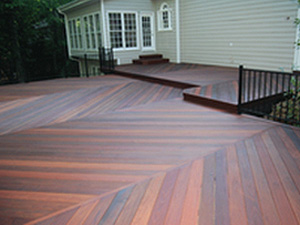A nice reminder of our 2011 website…
Common trade names: Brazilian Walnut and Ipe refer to several species of the Genus Tabebuia.
Genus: Tabebuia spp.
Janka Hardness (pounds-force): 3680
Description: Ipe is the hardest easily available tropical hardwood we offer. Its hues are generally an olive-brown, and the density of the lumber is quite impressive. Be prepared, as the grain pattern can be all over the place with this species. It’s as hard and durable as anything you’ll find.
Location: Central and South America
Common Aliases: Ironwood©, Pau d’Arco, Yellow Poui, Betharbara
Performance: It’s oily, it’s hard to glue, it’s hard to cut, and it will break every bit in your set. That said, once installed it’s awfully hard to beat. Many designers, builders, and homeowners regard this as an investment grade wood due to its ability to resist decay by weather or pest. Do not use compressed air tools without wearing goggles, gloves, thick clothing, in an otherwise empty room, as the fasteners will be airborne and elsewhere once you attempt to nail this material. Pre-drill, then screw, and it holds remarkably well. Hidden fastening systems were made for lumbers such as Ipe and Cumaru. Use air dried Ipe for outdoor projects, kiln dried for your indoor flooring and cabinetry applications.
Acclimation: Ipe for an outdoor application should be kept on site, stacked and covered for 10-21 days prior to installation. Generally speaking, Ipe will acclimate properly on the low end of this scale, but local climactic variations require a longer window.
Common Uses: Ipe is as hard as they come, and has been proven to withstand the rigors of nature. Ipe is our top selling wood, and is used in rainscreen siding applications, shiplaps, decks, docks, and more. For interior applications, flooring, cabinetry, turnings, and virtually any other project requiring a strong and durable lumber.
Specs below from: The Wood Database
Common Name(s): Ipe, Brazilian Walnut
Scientific Name: Tabebuia spp. (Tabebuiaguayacan, T. serratifolia, etc.)
Distribution: Tropical Americas (Central and South America)
Tree Size: 100 ft (30 m) tall, 2-3 ft (.6-1.0 m) trunk diameter
Average Dried Weight: 73 lbs/ft3 (1,175 kg/m3)
Basic Specific Gravity: .91
Hardness: 3,680 lbf (16,370 N)
Rupture Strength: 26,190 lbf/in2 (180,600 kPa)
Elastic Strength: 3,167,000 lbf/in2 (21,840 MPa)
